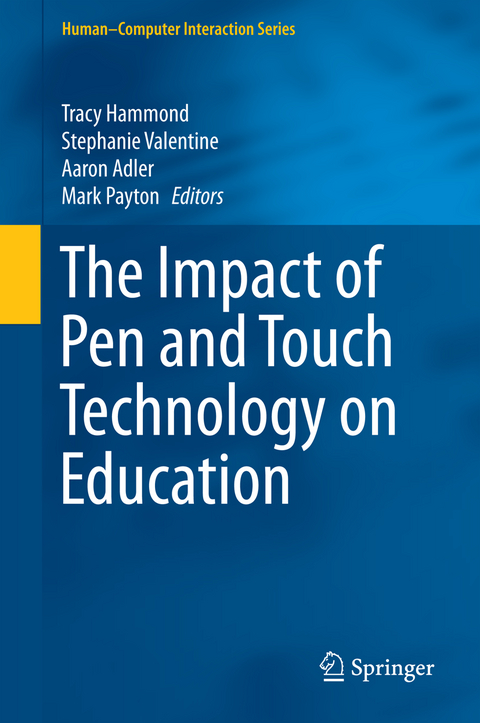
The Impact of Pen and Touch Technology on Education
Springer International Publishing (Verlag)
978-3-319-15593-7 (ISBN)
This book presents perspectives for and by teachers, school and university administrators and educational researchers regarding the great impact pen and tablet technology can have on classrooms and education.
presents three distinctly valuable threads of research:
- Emerging technologies and cutting-edge software invented by researchers and evaluated through real classroom deployments.
- First-hand perspectives of instructors and administrators who actively implement pen or tablet technologies in their classrooms.
- Up-and-coming systems that provide insight into the future of pen, touch, and sketch recognition technologies in the classrooms and the curriculums of tomorrow.
The Impact of Pen and Touch Technology on Education is an essential read for educators who wish get to grips with ink-based computing and bring their teaching methods into the twenty-first century, as well as for researchers in the areas of education, human-computer interaction and intelligent systems for pedagogical advancement.
Introduction.- Tools for Thinking.- Digital Pen Technology's Suitability to Support Handwriting Learning.- Studying Digital Ink Technologies with Children - Methods and Insights for the Research Community.- Easy Sketch: A Sketch-Based Educational Interface to Support Children's Self-Regulation and School Readiness.- Machine Interpretation of Students' Hand-Drawn Mathematical Representations.- Supporting Special Needs Students in Drawing Mathematical Representations.-Animated Mathematical Proofs in Elementary Education.- Logi Sketch: A Free- Sketch Digital Circuit Design and Simulation System.- Mechanix: A Sketch-Based Tutoring System That Automatically Corrects Hand-Sketched Statics Homework.- Sketch Worksheets: A Brief Summary.- Increasing Student Confidence in Engineering Sketching via a Software Coach.- Enhancing Instruction of Written East Asian Languages with Sketch Recognition-Based "Intelligent Language Workbook" Interfaces.- Classroom Uses for BeSocratic.- Use of Layers and User Manipulation to Improve Group Environments.- VText: A Tablet Based E-Textbook Framework.- Embodied Interaction through the Fingers: Ebooks for the Blind and Navigation in Virtual Spaces - Beyond 'Apps' on Tablets: Making Sense of Learning Within Technology Ecologies.- Improving Student Understanding with Video Grading.- "Kids Teaching Kids": Student-Created Tablet- Based Mathtrain TV Tutorials for a Global Audience.- Using Technology to Pair Cognitive Demands of Tasks to its Appropriate Community in a Maths Classroom.- The Flipped Classroom: Touch Enables, Academically Proven.- A More Inclusive, Less Distracting and Engaging Learning Environment Through SmartSync.- Make it Mobile: Best Practices for Science Courses in iTunes U.- Using Shared Microsoft OneNote 'Binders' to Create a School Environment for Sharing, Continual Formative Assessment, and Information Organization.- Using iPad to Make E- Flashcards and Sharing The E-Cards Through Doceri.-Analyzing Trends in Pen Computing among K-2 Students through Flashcards Application.- Student Exploration: App(lying) Technology for Health Education and Promotion.- Tablet Computers in the University Classroom of 2012: Opportunities and Challenges.- Tablet PCs in a Code Review Class.- Statistics in the Classroom in Touch-Based Smart Phones.- Using InkSurvey with Pen-Enabled Mobile Devices for Real-Time Formative Assessment: Application in Diverse Educational Environments.- Using InkSurvey with Pen-Enabled Mobile Devices for Real-Time Formative Assessment II: Indications of Effectiveness in Diverse Educational Environments.- An Interactive Learner-Centred Classroom: Successful Use of Tablet Computing and Dyknow Software in Foundational Mathematics.- Using BioMedical Applications in Touch and Ink Mobile Apps to Engage and Retain Stem Students in Calculus.- The Impact of Tablets on School Leadership.- Facilitating Pedagogical Practices through a Large-Scale Tablet PC Deployment.- A Vision for Education: Transforming How Formal Systems are Taught within Mass Lectures by Using Pen Technology to Create a Personalized Learning Environment.- Pen-Based Problem-Solving Environment for Computational Science.- A Ubiquitous, Pen-Based and Touch Classroom Response System Supported by Learning Styles.- Feedback From Physiological Sensors in the Classroom.
| Erscheint lt. Verlag | 21.7.2015 |
|---|---|
| Reihe/Serie | Human–Computer Interaction Series |
| Zusatzinfo | XXXIV, 387 p. 141 illus., 117 illus. in color. |
| Verlagsort | Cham |
| Sprache | englisch |
| Maße | 155 x 235 mm |
| Themenwelt | Schulbuch / Wörterbuch ► Unterrichtsvorbereitung ► Unterrichts-Handreichungen |
| Mathematik / Informatik ► Informatik ► Betriebssysteme / Server | |
| Informatik ► Software Entwicklung ► User Interfaces (HCI) | |
| Schlagworte | Educational technology • Ink-Based Computing • Pen and Touch • sketch recognition • Touch Interfaces |
| ISBN-10 | 3-319-15593-8 / 3319155938 |
| ISBN-13 | 978-3-319-15593-7 / 9783319155937 |
| Zustand | Neuware |
| Haben Sie eine Frage zum Produkt? |
aus dem Bereich


